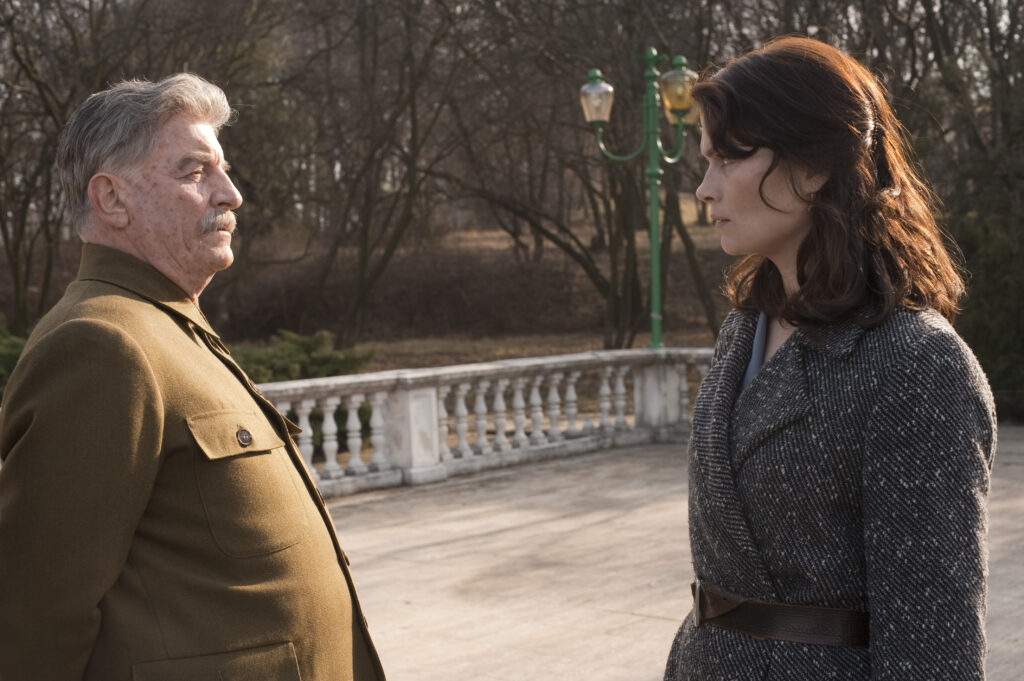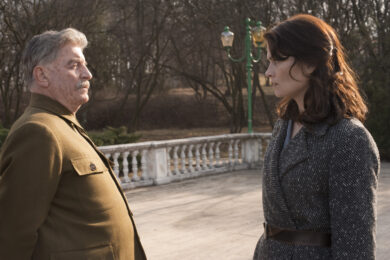An Ordinary Execution
Creating a sense of dread around a genocidal bastard is notoriously tricky to pull off on screen, given our rather excellent comedic heritage of tarring and feathering such authoritarian figures in ridicule – Chaplin’s The Great Dictator probably epitomises the maniacal tyrant of a new world politics best.
An Ordinary Execution focuses on the ordeals of a female doctor during the final few syphilitic months of Joseph Stalin. Avoiding the caricatured image of a barking megalomaniac, the film creates a deeper tension and subtler monster from the fear created by Stalin’s inhuman pragmatism. Cleverly portrayed as something of a double-edged sickle, Stalin is both man of the people and twisted murderer.
It opens at the start of the Jewish doctor conspiracy, in which Stalin at the peak of his paranoia locked away and tortured all the surgeons and doctors of the Kremlin as well as his personal physician of 20 years – who in fact turned out to be a British spy. This atmosphere of constant suspicion and fear is shown in the film to filter down to ordinary lives of citizens. Anna (Marina Hands), a doctor who is desperately trying to get pregnant with her adored husband, comes to the attention of her colleagues for her controversial healing methods. Soon most men she encounters seem to want to blackmail into some form of sexual congress using the threat of being reported to the authorities – her husband’s Jewish roots causing potential for greater intimidation.
Eventually her unique healing methods come to the attention of high powers and the ailing Stalin orders her services. Our introduction to Stalin carries on this double-sided mystery. At the end of a long room sits the figure of a kindly old man who would more likely hand out Werther’s Originals than random death sentences. Though foremost French actor André Dussollier bears a frightening resemblance to Stalin, it’s an old, weathered Stalin unfamiliar from the once ubiquitous portraits. That he continues to conduct himself in a genteel manner adds an uncomfortable sinisterness, as the reports of Stalin’s arbitrary slayings flow as thickly as his charm to which Churchill once famously attested. The old joker even jests about his favourite scene from The Great Dictator The pragmatism with which Stalin conducts his state – finding a “solution” to the “problem of Anna’s husband” and the way he matter-of-factly criticizes Hitler for being to soft – are particularly well placed. Despite his exterior you never feel comfortable with the character.
At the same time, you never feel totally threatened. Stalin is a man of myth to almost the degree that he is a man at all. So much has been written and claimed about Stalin’s instability and madness in his later life that you can’t help but feel this was a slightly watered down portrayal – Robert Harris wrote that the aged Stalin used to make his generals dance to records of dogs barking. Of course you can’t vouch for the accuracy of much of what is reported about such a guarded individual, but it might make for more interesting cinema than the old guy dying slowly on a leather sofa.
Despite feeling a little rushed in places, An Ordinary Execution is a gripping story in the mists of an anxious and unsettling world.
Leap Year

Leap Year is a brave and commendable attempt at creating claustrophobic tension though minimalist setting. Freelance journalist Laura Lopez (Monica del Carmen) lives in a modest apartment in Mexico. Shot entirely within the confines of her flat, her own sense of frustration and hampered escape is etched onto the screen; that no matter where her mind goes, she’s somehow glued to this small flat. Aside from the film’s much talked about explicit content, Laura is very much painted as a sweet natured dreamer with a great deal of passion along with her sadness and self-depreciation.
At the start of the film Laura crosses out the 29th February in red on her calendar, crossing the other days in black as the days tick by. In the meantime she spends the evenings fishing for men in clubs and having a lot of sex back in her room. Some of these often made for the more comedic scenes of the film. Despite the explicitness, it never felt like the intention was to stir great pools of eroticism. The still shots and borderline-bored expressions glued on the faces of her and her various captives tapped into something very matter-of-fact, almost inevitable and unromantic. As the number of lovers increased, so did the banality of the sex – in the end there was the impression that two slabs of meat being slapped together would have made for suitable stand-in props. As her conquests leave in various degrees of subtlety, her reactions of longing are again smattered with the comedy of sadness.
One night she meets her knight in shining armour – which she quickly removes – who awakens her more experimental and violent tendencies. Clearly, she is swept away by something in this man’s deprivation, and their evenings together get more and more daring, explicit and, well, fun.
Throughout the film, she comes back to the box in the calendar scribbled in red. The significance of the date is disheartening, yet the ceremony she sets herself aside is slightly unconvincing and trite. With this date pulling the film forwards from some unseen dip just over the horizon, there’s a sense of having joined a particularly long and arduous queue that plods slowly forwards through sticky under-floor only to discover at the front of the queue they’re handing out stale sentimentality.
The film built slowly, working towards the finale with a certain grace in subtlety towards its conclusion. However, it lacks the tension it was clearly meant to have and though its occasional moments of brilliance are not completely lost, they certainly don’t save it.
Road To Las Vegas

A powerful and arresting documentary that follows the trials of Vanessa and her family as they drive down from Alaska to start a new life in Las Vegas. With only 290 dollars in the world, she is driven by her conviction that God appeared to her in a dream and promised a new and better life. Bursting with optimistic exuberance and fervent in her religious conviction, she merrily takes her family to a car park that backs onto the airport, which, with six of them and a pet dog cramped in the vehicle, will be their home for the foreseeable months. Seeing herself on a mission from up high, Vanessa’s mood never dips. As the desperation of their situation rolls on, there’s a dim awareness that this cheerfulness somehow isn’t going to last for long, and you’ll never have wanted to believe in God so much.
Along with the squalor and the voices from God, the impressively incompetent husband she drags along with her completes the unholy trilogy. Half the time he skulks around like a grounded teenager, but it doesn’t take him long to prove his skills as a Tazmanian devil of destruction. His attempts to overcome his drug addiction are flimsy despite taking a shocking toll on his family. More baffling than her husband’s lack of will is Vanessa’s tolerance and willingness to forgive his multiple transgressions.
Filmed over four years, it’s screened in four corresponding chapters, each of which opens a door to a hellish new world – as if conceived by a modern day Dante obsessed with social realism. Watching Vanessa struggle to provide for the family and hold them together – despite vast adversity – is admirable and incredibly heart-warming. Yet the realisation that hangs over their every turn is that their desperate situation is rooted in her hearing the voice of God. As the film continues, suggestions of Vanessa’s erratic nature are given by her mother – a real old west style flick-knife grandma – and her eldest daughter.
As the twisted love story plummets into the recession years, there’s a poignant reflection on the further reaching social injustices created by the banking crisis and the government’s subsequent handling. Uplifting as well as soul-churning, Road To Las Vegas is an intriguing story that will leave you mourning, grateful and deeply irritated.
The Girl Who Kicked The Hornet’s Nest
(148 minutes reviewed in one sentence)
Like the best fucking episode of Bergerac you’ve ever seen, but still a bit like an episode of Bergerac.



